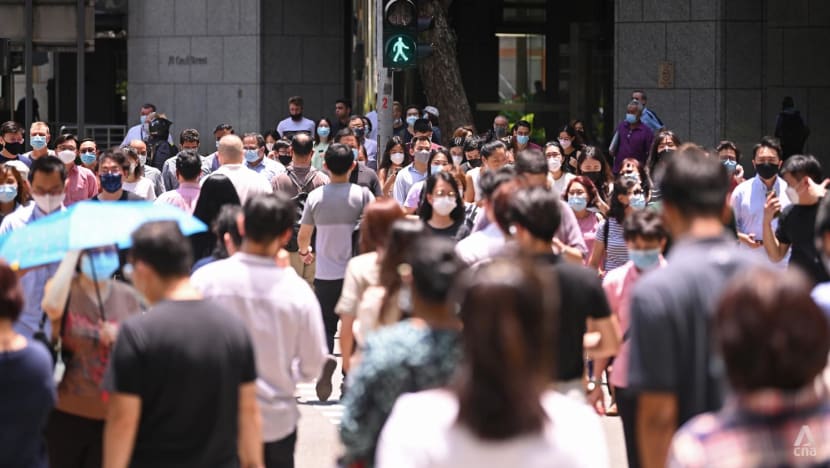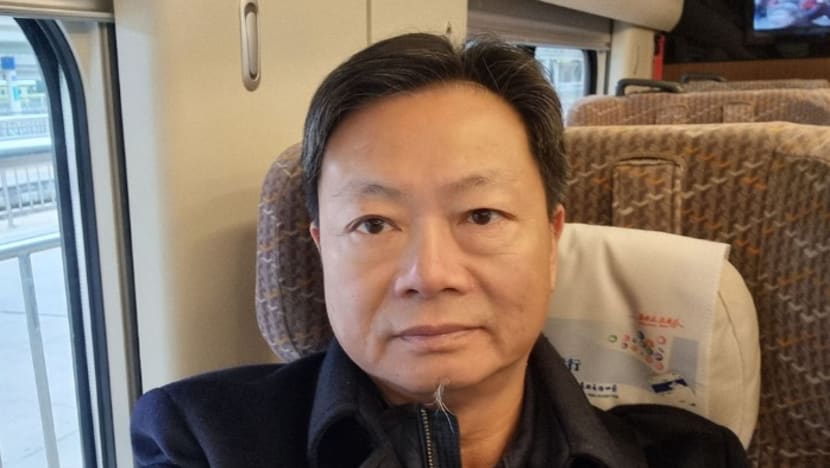Commentary: Singapore is wide open for business, but not for foreign interference
The designation of Singaporean businessman Philip Chan as a "politically significant person" under a law to counter foreign interference has caught the attention of business leaders. FICA will not affect their legitimate activities, says S Rajaratnam School of International Studies’ Benjamin Ang.

People in the central business district in Singapore on Mar 25, 2022. (File photo: CNA/Gaya Chandramohan)

This audio is generated by an AI tool.
SINGAPORE: In a move that has captured the attention of business leaders in Singapore - especially those with substantial dealings overseas - a Singapore businessman, Mr Philip Chan Man Ping, was last week the first person to be designated as a "politically significant person" (PSP) under a law to counter foreign interference.
Business leaders are understandably concerned, and some may be wondering if their business activities overseas might also put them at risk of being designated PSPs under the Foreign Interference (Countermeasures) Act, or FICA. They may be uncertain about which overseas activities are acceptable or not, especially if their activities involve promoting goods or services or business in foreign countries.
What we do know for sure is that the Ministry of Home Affairs had assessed that Mr Chan’s activities “are directed towards a political end in Singapore” and that it is “in the public interest for countermeasures under FICA to be applied to Chan”.
We also know that under the clauses of the law, a person may be designated as a politically significant person under FICA if two conditions are met:
- He or she has carried out activities towards a political end in Singapore or is a member of a foreign legislature or political organisation, and
- the authorities believe it is in the public interest to designate him or her as a PSP.
To meet the first condition, an activity towards a political end could include organising public events where foreigners promote foreign political causes. For example Mr Chan was issued a warning by the Singapore police in 2019 for facilitating an illegal public gathering to discuss the Hong Kong protests.
Such activity could also include giving public interviews deemed as promoting a foreign political cause. For example, Mr Chan gave a media interview where he called on overseas Chinese to work together to “tell China’s story well”, because his own influence was limited.

MOST ORDINARY PEOPLE JUST AREN’T POLITICALLY INFLUENTIAL
FICA itself defines an activity as having a “political end” if it seeks to promote the interests of a political party or entity; influence any election; influence governmental decisions or legislative bodies; change the laws of Singapore; influence public opinion on controversial matters; or influence political views.
Looking at the definition and the current facts, it appears that an ordinary person who merely promotes foreign goods or services, encourages investment in foreign businesses, invites others to do business in foreign countries, or attends meetings with foreign political leaders, would not be engaging in activities to a political end.
Business leaders often speak positively about foreign countries, business opportunities, business associates, and their experiences overseas. These endorsements are not political activities. However, one may be justifiably wary of attending foreign meetings where one may be pressured to take a public stand on political issues.
In such instances, the ordinary businessperson can take comfort that a second condition – that designation is in the public interest - must be met before being designated as a PSP.
Home Affairs and Law Minister K Shanmugam said in parliament on Feb 29 that even if a person “could be a member of a foreign political organisation”, they would not be designated a PSP “if the public interest criterion is not satisfied.”
To meet this second condition, it appears in this case that the public interest is met if the person is an influential business leader. Mr Chan had led the Hong Kong Chamber of Commerce in Singapore, the Kowloon Club, and the Hong Kong Singapore Business Association, and was a patron of the Kampong Chai Chee Citizens' Consultative Committee and the Bukit Timah Community Club Management Committee.
Most of us are just not as influential.
FICA should not and does not make political activity illegal. Ordinary people who participate in political activities, promote interests of a political entity, or seek to influence governmental decisions or legislative bodies or public opinion, are unlikely to qualify to be designated as PSPs.
This is consistent with the statements from the parliamentary debate on the Bill, where Mr Shanmugam clarified that “FICA will not stop individuals, businesses and organisations in Singapore from building overseas partnerships, soliciting overseas businesses, networking with foreigners, sourcing for donations, discussing government policies or political matters that affect their businesses with foreign colleagues or business partners, or supporting charities”, as long as they are done in an open and transparent manner and do not manipulate Singapore's political discourse or undermine security.
“It will also not cover Singaporeans expressing their own views,” Mr Shanmugam said.
The basic principle is that a PSP designation should only apply where there is a risk of foreign interference, and it acts by requiring influential leaders to be transparent about their sources of funding and support.
By definition, all political office holders, Members of Parliament (MPs), non-constituency MPs and Nominated MPs, Central Executive Committee members of political parties, election candidates and their election agents, are PSPs under FICA. All PSPs naturally participate in political activities, and FICA does not inhibit them from doing so, but instead requires them to disclose their political donations, foreign affiliations and migration benefits.
This requirement for disclosure could prevent scandals like those in Australia, where politicians were discovered to have received substantial secret donations from foreign businessmen, which may have affected their political stand on controversial issues.
In Parliament on Thursday (Feb 29), MP Gerald Giam requested for more details from the Ministry of Home Affairs (MHA) on its criteria for designating individuals as politically significant persons (PSPs). He cited the example of Mr Philip Chan, who had shown susceptibility to be influenced by foreign actors and a willingness to advance their interests. Mr Giam also wanted to know how MHA assesses the risk of foreign interference and public interest in applying the Foreign Interference (Countermeasures) Act to PSPs.
STILL OPEN FOR BUSINESS
In the current volatile geopolitical situation, there are numerous political causes where foreign entities - countries, organisations, businesses, billionaires - might want to influence public opinion in Singapore, such as the Russia-Ukraine war, the Israel-Hamas war or regional elections. This designation sends a signal that Singapore requires them to do so openly and transparently.
At the same time, Singapore remains dependent on international trade. As Prime Minister Lee Hsien Loong has said, Singapore is “wide open for business”.
Whenever FICA is used again to designate a PSP, the criteria must remain strict, to avoid a chilling effect on business. This need for economic self-preservation may also mitigate any potential risk of FICA being misused to suppress legitimate political activity.
In the coming months, the business community and the public would benefit from more public discussion on what amounts to activity towards a political end and what amounts to public interest. The clearer the law is, the more it will encourage investment and allow for better planning, risk management and strategic decision-making.
Benjamin Ang is Head of the Centre of Excellence for National Security at the S Rajaratnam School of International Studies at Nanyang Technological University.














